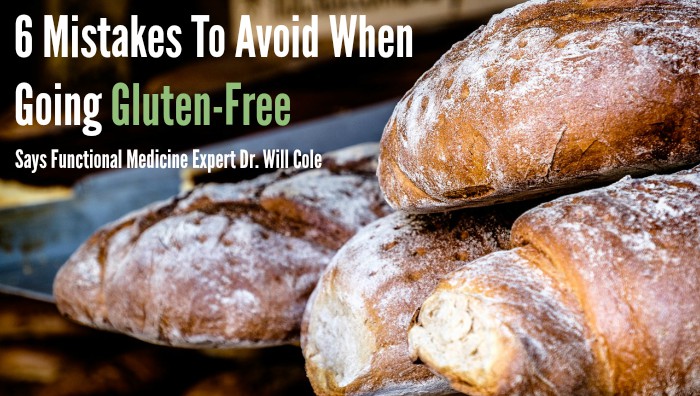Join our Free Collagen Breakfast Challenge and WIN a 3-month supply of Further Food Collagen Sign up here!
Want to read more? Stop IBS Symptoms Immediately (And Finally Feel Better!) With These 10 Tips from Dr. Mark Hyman Are Hidden Allergies Destroying Your Body? A 6-Week Diet to Combat Them 4 Steps and 6 Foods That Will Fix A Leaky Gut, Says Dr. Josh Axe Can Autoimmune Disease Be Healed? This Story from Dr. Hyman Will Astonish You6 Mistakes To Avoid When Going Gluten-Free, Says Functional Medicine Expert Dr. Will Cole

Embracing a gluten-free diet can certainly provide health benefits. Functional medicine expert Dr. Will Cole often recommends that his patients with autoimmune disorders or other inflammatory conditions give it a try. However, if you’re making one of the mistakes that Dr. Will Cole sees most often, you may be negating the benefits! Here’s 6 mistakes to avoid if you’re giving up gluten.
Have you tried going gluten free? Cutting out gluten can have significant improvements to your health, and I often recommend to my patients in my functional medicine practice to give it a try. However, it’s not always easy, and I find that a lot of people don’t do it right, so they don’t get the full benefits.
Gluten is a protein that is found in grains such as wheat, rye, spelt and barley. Research shows that gluten can be highly inflammatory for a lot of people. While gluten affects people in different ways, gluten exposure has been tied to leaky gut syndrome and increased inflammation in the body, which are major concerns for those with chronic or autoimmune disorders.
If you’re one of the 2.7 million Americans (and millions more worldwide) who avoid gluten or know someone who does, here are the top mistakes I see people make when they decide to embrace a gluten-free diet.
1. Giving up too soon
A few weeks or even a month of going on a gluten-free diet is, for many people, just not enough to see if it’s an important factor in your health. I have found that gut problems like leaky gut syndrome can take up to a year of being gluten free to fully heal. It makes sense: a chronic health problem that has taken years to become what it is today, won’t go away in three weeks. So be patient, and try going gluten free for several months or even a year to really see if it is really making a difference in how you feel.
2. Getting incomplete gluten-sensitivity labs
If you are thinking about trying to go gluten free, you may want to know if it’s even the right move for you. Testing for gluten sensitivity is helpful, but only if you get a complete set of tests. Normally, you are given only an alpha gliadin lab—the standard lab test for gluten intolerance—and if this comes back negative, you may want to celebrate the good news eating a bagel. But, not so fast! Most people don’t realize that there are about 24 different aspects of wheat that your body can be reacting to. Alpha-gliadin is just one part of the gluten-intolerance spectrum, with gluten sensitivity on one end of the spectrum and celiac disease on the other end. A functional medicine doctor can help you get properly tested for all the different gluten sensitivities.
3. Going “mostly” gluten free
If you decide to go gluten free, eating “a little bit” of gluten is like being “a little bit” pregnant—it just doesn’t make any sense. The only way to find out if your body has a problem with gluten is to eliminate gluten entirely. No cheating! Normally, I suggest eliminating gluten entirely for at least 60 days.
4. Eating a lot of gluten-free boxed foods
Just because something is labeled gluten free doesn’t mean it’s automatically healthy! Sometimes a gluten-free packaged food can be just as (or even more unhealthy) than the original food! So, when going on a gluten-free diet, make sure you eat plenty of nutrient-dense and anti-inflammatory healthy fats, proteins and organic plant-based foods. Minimize the packaged foods!
5. Eating cross-reactive foods
If you’ve gone gluten free and initially felt better, but then hit a plateau, cross-reactivity is something to consider. There are some foods that do not contain gluten, but your body could be treating them like gluten. Sort of like a case of mistaken identity! Ask your doctor about lab work that can help you identify these foods, which can include gluten-free grains, milk, coffee, chocolate and eggs (just to name a few). Depending on the specific case, you might have to eliminate these foods entirely from your diet because your immune system treats them like gluten.
6. Assuming that a gluten-free diet will cure all of your problems
Going gluten-free can be a piece of your health puzzle, but it’s rarely the entire picture, and sometimes may not be an issue for you at all. You may have to consider other health concerns like histamine intolerance and FODMAP intolerance, which are often overshadowed by gluten’s popularity. In functional medicine, we focus on the big picture, so make sure you consider a variety of factors that can play a role in your symptoms and your health.
We are all different, and gluten affects us all differently. I recommend getting a comprehensive functional medicine perspective to find out which foods your body loves and which foods it hates. And if you do find out that gluten is a problem for you, don’t allow these six mistakes to hinder your efforts to eliminate it from your diet and live a healthier life.
BE HEALTHY EVERY DAY with Further Food Collagen Peptides! Collagen heals your body from the inside out. Learn more here!





















